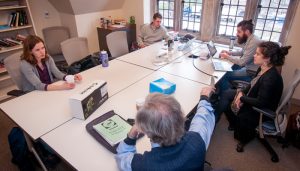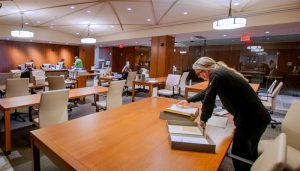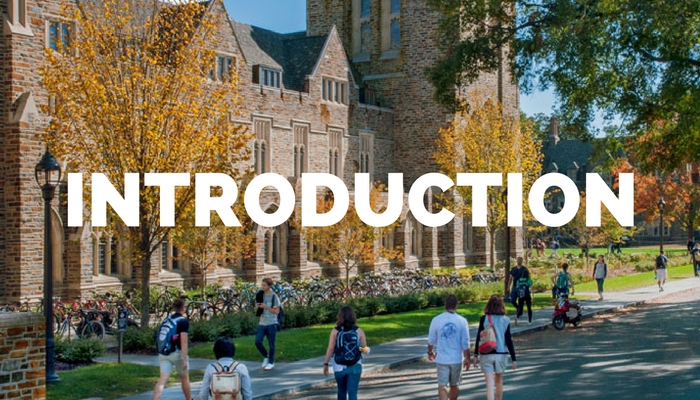We are very pleased to share with you our new strategic plan. It is the culmination of a long process of thinking, sharing, discussing, and synthesizing diverse ideas, and it represents our library-wide roadmap for the next five years.
The work of a research library has grown more complex in the past decade, and this plan reflects both that transformation and our aspirations. It is an ambitious plan, but we think that’s a good thing. We reached our present level of success by being ambitious and by being open to new challenges and opportunities. The Duke University Libraries are one of the top private research library systems in the country. We enjoy the respect and support of the community we serve precisely because our staff are creative and willing to try new things, take chances, grow, collaborate, and reach very high and very far.
We hope you enjoy this preview of what’s in store over the next five years. We look forward to reaching higher and farther still!
Recent years have been transformative for the Duke University Libraries. We have continually redefined ourselves, through significant change that is perhaps most visible to our communities in the renovations to our physical spaces. But transformation is also evident in our nimble, responsive services, in our approaches to collection-building and providing expanded access to information, and in our staff’s collective knowledge and skills.
Our previous strategic plan, Sharpening our Vision, articulated five primary directions that guided us through these years of change: 1) Improve the User Experience, 2) Provide Digital Content, Tools, and Services, 3) Develop New Research and Teaching Partnerships, 4) Support University Priorities, and 5) Enhance Library Spaces.
This document identifies five new directions for the Duke University Libraries that build upon the innovations made possible by the previous plan:
- Our Libraries Create Platforms for Scholarly Engagement
- Our Libraries Teach and Support Emerging Literacies
- Our Libraries Advance Discovery
- Our Libraries Partner in Research
- Our Libraries Transform the Information Ecosystem
The strategic directions, goals, and guiding principles that follow were informed by many rich resources and conversations available to the Duke University Libraries Strategic Planning Steering Committee. Among those resources are the draft frameworks for Duke University’s strategic plan and for the revisions to the undergraduate curriculum. The committee also had access to thoughtful and creative pre-strategic planning documents prepared by more than 20 library department heads in early 2015, as well as assessments such as the Ithaka S+R Faculty Survey. Members of the committee met face-to-face with student and faculty advisory boards to solicit their projections for the future of research, teaching, and libraries. Crucially, we also convened gatherings of nearly 100 library staff members, and from the notes to those meetings we drew this plan’s several goals.
The Duke University Libraries and the staff of the Libraries are international leaders. The vision expressed in our strategic directions and goals is representative of the revolutionary changes taking place within research libraries across the world, but our ideas are uniquely Duke. This plan provides an ambitious and innovative roadmap for the Duke University Libraries for the coming five years.
Our goals can only be achieved within a culture that embraces the principles found below. These principles define who we are and who we strive to be. They inform the five strategic priorities and goals that follow, and will guide our actions and decisions as we implement this plan.
 We design and deliver user-centered services: We are responsive, innovative, and rigorous. We are dedicated to collaborating with patrons to achieve their learning objectives and research goals. We are committed to providing outstanding service based on respect and empathy for the diverse backgrounds and needs of our community. We work as a team to guide, instruct, consult, and partner with our users. We are integral to our patrons’ pursuit of scholarship, and we anticipate and advocate for their needs in an ever-changing information landscape.
We design and deliver user-centered services: We are responsive, innovative, and rigorous. We are dedicated to collaborating with patrons to achieve their learning objectives and research goals. We are committed to providing outstanding service based on respect and empathy for the diverse backgrounds and needs of our community. We work as a team to guide, instruct, consult, and partner with our users. We are integral to our patrons’ pursuit of scholarship, and we anticipate and advocate for their needs in an ever-changing information landscape.
Staff development leads to innovation: We foster a work environment that promotes learning, intellectual growth, and skill development in our workforce in order to keep pace with constant change. We empower all staff to explore, experiment, and cross boundaries. We leverage professional development to provide a more expert, informed, and innovative organization to support and collaborate with tomorrow’s faculty and students.
Diversity strengthens us: We rely on diverse opinions, backgrounds, and experiences to make better decisions and invigorate our organization. We are inclusive, supportive, and respectful, ensuring that all points of view are heard and understood. We seek to reflect the diversity of our patron communities in our services, collections, staff, and spaces. We build, maintain, and provide access to an international and multilingual collection, representing the broadest possible spectrum of cultures, ideas, and information.
 We cultivate and connect communities: As new technologies and spaces enable new ways of networking, and as Duke University itself becomes increasingly global, our understanding of who comprises our intellectual communities evolves. We take pride in our ability to identify, engage with, and support the many learning, research, and service communities thriving at Duke, in Durham, in the Triangle and beyond. The Libraries serve as a physical and intellectual hub, facilitating connections, collaborations, and interdisciplinarity.
We cultivate and connect communities: As new technologies and spaces enable new ways of networking, and as Duke University itself becomes increasingly global, our understanding of who comprises our intellectual communities evolves. We take pride in our ability to identify, engage with, and support the many learning, research, and service communities thriving at Duke, in Durham, in the Triangle and beyond. The Libraries serve as a physical and intellectual hub, facilitating connections, collaborations, and interdisciplinarity.
We break down barriers to scholarship: We recognize the incalculable benefits that open access, open source, and open standards confer, and we prefer their use whenever appropriate. We support and advocate for openness in all forms. We actively participate in regional and national organizations, and we partner to ensure the proper stewardship of the world’s cultural heritage. We encourage patrons and partners to embrace an open mindset to scholarship, increasing their work’s impact on knowledge and society and empowering those who follow in their footsteps.
I. Our Libraries Create Platforms for Scholarly Engagement
We strive to be a virtual and physical communal space that provides high-quality teaching, research, and publication environments. We will provide platforms for collaborating, creating, collecting, exhibiting, and communicating new forms of scholarship and expression. We will build and cultivate online environments where patrons can view, discuss, annotate, and/or interact with digital objects. We are a host within an international library network that gathers and curates collections while preserving them for future users.
Goals:
- Develop the Duke Digital Repository to support all formats of research and scholarly work, increasing the diversity of resources for scholars and expanding the Libraries’ capacity to store, publish, and publicize unique digital and digitized collections.
- Expand the Libraries’ role in open access and web publishing in order to increase the scope of freely available digital resources and support scholarship at Duke.
- Expand the DUL’s digital content capturing tools and services in partnership with local, regional, and national research communities to contribute to the international effort to archive digital content and to ensure that Duke community needs and interests are represented in that effort.
- Enhance the services and spaces of Lilly Library and Duke Marine Lab Library to provide excellent research and learning environments and to support scholarly engagement.
II. Our Libraries Teach and Support Emerging Literacies
 Our communities look to us to help them understand, utilize, and transform information, both within the curriculum and beyond. As modes of information gathering and processing change, we must embrace and support evolving practices. We will educate successive generations of students and scholars, developing their fluency in technological, data, visual, and cultural literacies. We will bridge the gaps between these new literacies and those we have traditionally supported. We will commit to an ongoing dialogue with the new, in order to remain vital to the scholarly endeavor in all its forms.
Our communities look to us to help them understand, utilize, and transform information, both within the curriculum and beyond. As modes of information gathering and processing change, we must embrace and support evolving practices. We will educate successive generations of students and scholars, developing their fluency in technological, data, visual, and cultural literacies. We will bridge the gaps between these new literacies and those we have traditionally supported. We will commit to an ongoing dialogue with the new, in order to remain vital to the scholarly endeavor in all its forms.
Goals:
- Expand the presence of library staff in the student experience in order to understand and support emerging scholarship, information, data, and literacy needs
- Mentor first-year students in scholarly research and learning practices, embracing and building upon their diverse backgrounds, prior knowledge, literacies, and expectations as they begin their Duke experience.
- Partner with faculty to develop research methods, curricula, and collaborative projects connecting their courses to our collections.
- Enhance the library instruction curriculum, focusing on standards and best practices for pedagogy that will prepare users for lifelong learning in a global and ever-changing research environment.
III. Our Libraries Advance Discovery
New technologies and emerging opportunities for collaboration enable more sophisticated and effective tools for finding and accessing information. We will engage with our communities to build and expand access to collections of global significance and to make information more discoverable, regardless of format, origin, and ownership.
Goals:
- Improve discovery and delivery of physical and electronic information resources, including resources that are not held or hosted by Duke University Libraries as well as those that are.
- Improve the discovery and delivery capabilities of the Duke Digital Repository, including the creation of metadata and linkages to catalog records.
- Conceptualize and implement description (cataloging and metadata) in ways that assure its usefulness in and interoperability with national and international discovery systems.
IV. Our Libraries Partner in Research
 Our engagement throughout the research lifecycle enhances the quality and impact of researcher projects and student scholarly expression. We actively seek partnerships in scholarly projects in order to expand our involvement throughout the scholarly enterprise.
Our engagement throughout the research lifecycle enhances the quality and impact of researcher projects and student scholarly expression. We actively seek partnerships in scholarly projects in order to expand our involvement throughout the scholarly enterprise.
Goals:
- Increase awareness of the integrated services the Libraries offer for teaching and research at all levels through broad communication, publicity, and branding.
- Increase support to assist faculty and students with the deposit, preservation and discovery of their research materials, as appropriate, in local or domain-specific repositories.
- Ensure that Libraries staff possess or acquire advanced knowledge of discipline-based research processes, outputs and scholarly communication, in order to become active, contributing members of a research team.
- Highlight and promote the scholarly activities and contributions of faculty, students, and library staff in creative ways through the DUL’s public programming and exhibition programs.
V. Our Libraries Transform the Information Ecosystem
 As champions of intellectual freedom, we actively represent the interests of Duke University in a global effort to revolutionize the way information is distributed, evaluated, made available, stored, and preserved. Through innovative and broadly collaborative approaches to the creation, collection, and dissemination of knowledge, we work to create a future in which the full diversity of the human record is openly accessible.
As champions of intellectual freedom, we actively represent the interests of Duke University in a global effort to revolutionize the way information is distributed, evaluated, made available, stored, and preserved. Through innovative and broadly collaborative approaches to the creation, collection, and dissemination of knowledge, we work to create a future in which the full diversity of the human record is openly accessible.
Goals:
- Deepen involvement with and commitment of resources to collaborative projects with other libraries, museums, and open collections efforts to diversify and expand access to materials not presently freely available online.
- Encourage the strengthening of Duke’s open access policies, provide active outreach to faculty, and identify ways to make open access publishing easier to accomplish.
- Recognize and invest in the Libraries’ staff as leaders in the cooperative development of library and information tools, capacities, collections, and communities.




